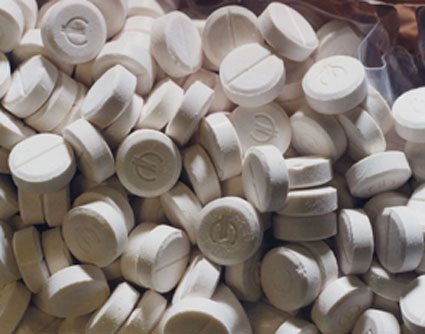what have you done to me? i'll never be the same...
for many years ecstasy has been blamed for the deaths of young people around the world. even today very little scientific research is being done on the drug and not enough is known about it.
the few studies that have been done claim that its dangers are vastly over-exaggerated. a 2007 study in british medical journal the lancet evaluated the harmfulness of 20 common drugs - with the exception of crystal meth. ecstasy was found to be the 18th-most harmful drug, far less harmful than heroin (first), alcohol (fifth), tobacco (ninth) and even cannabis (11th).
historically many psychologists and victims of post-traumatic stress disorder found great value in the use of ecstasy as a treatment aid for patients - prior to its ban by governments around the world.
taken in a normal dosage, ecstasy does not make a person hallucinate, does not make them lose control of their actions and does not cause them to lose their memory. most ecstasy users say that their experience with ecstasy has improved their life and even continue to say so years after they have stopped taking it.
the majority of ecstasy-related deaths occur because other drugs are combined with ecstasy - whether it is from obtaining a pill that contains a dangerous mix of drugs - or voluntarily taking other drugs with ecstasy.
new york city's deputy-chief medical officer reviewed the unnatural and accidental deaths of 19000 victims in new york city over a three-year period. he found only two of those 19000 deaths were caused by pure ecstasy. during this period the drug enforcement agency estimated more than 110 million doses of ecstasy were taken in new york city.
ecstasy is known to have side-effects. it decreases the brain's serotonin function. a 2003 study in the journal of nuclear medicine indicates a five percent reduction in serotonin function and the return of full serotonin function after a few months of abstinence. there are currently no other credible studies available to support or disclaim these results. the long term effects of moderate ecstasy use on the brain are not known.
ecstasy can also lead to hyper-thermia. when used in environments like dance clubs, ecstasy can significantly elevate a person's body temperature. this can usually be controlled by drinking moderate amounts of water and taking short breaks from the hot environment to allow the body to cool down.
heavy ecstasy use causes serious memory deficiencies - similar to how heavy alcohol use causes liver disease and heavy smoking causes lung cancer.
in america no other drug has spread as quickly as ecstasy when it first appeared, and only cannabis currently attracts more first-time users. as a result more scientific research needs to be done in order to understand ecstasy and the effects it has on the human body. governments should allow and encourage scientific research on ecstasy - who knows, it may turn out to be a good thing for us all in the end!











